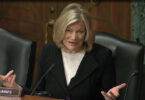Today Acting Comptroller of the Currency Michael J. Hsu spoke about the OCC’s objectives in regulating stablecoins as protecting consumers and the U.S. dollar. He shared his distinctive perspective of the multiple ways in which stablecoins currently lack interoperability and why it matters.
The underbanked are overrepresented in crypto
Early in his talk, Hsu noted that cryptocurrency has a very high penetration amongst the underbanked at 37% compared to 10% for the fully banked. Asked why this is the case, he was frank in observing a feeling that the traditional financial system has let down communities.
But he’s concerned that the crypto sector might not be the answer. “You’ve gotta go in (with your) eyes wide open and understand this stuff,” said Hsu. “Don’t be fooled (into taking) one set of trust vulnerabilities and trading that for another set of trust vulnerabilities.”
And when it comes to stablecoins, the run risk is seen as an issue. “If there were to be a run on stablecoins, the entire crypto economy would likely be impacted, causing outsized losses for ordinary people,” said Hsu.
Why interoperability matters
Hsu’s thoughts on interoperability were interesting because of his distinctive analysis. He noted that the topic of interoperability is generally ignored with stablecoins. That’s because stablecoins are currently primarily used for trading, which gets around the issue. But when used for payments and other web3 activities, he sees some challenges.
There’s interoperability between commercial banking money in the banking system, where a dollar has the same worth no matter which bank is used. However, that paused in 2008 when people started worrying about whether particular banks might collapse. And that was also the case in Europe during the Greek banking crisis. In the absence of interoperability, systems are fragmented.
Hsu has a problem with fragmentation from an inclusion perspective. With fragmented systems, operators will incentivize consumers to use their systems. He gave the example of how travel points encourage people to stay at one hotel brand rather than another. And in the crypto world, tokens are given as rewards.
“The point of that is to be exclusive. That’s the design, that’s the incentive structure there,” said Hsu. He can see a role for that early on. However, “We’ve already seen in the traditional banking and financial system, we have inclusion challenges.”
“So if we can develop a new system and at the get-go ensure that it’s inclusive, I think that’s a shared objective.”
Interoperabilty: between stablecoins and blockchains
A distinctive observation by Hsu was how for one given stablecoin such as Tether or USDC, it exists on multiple blockchains. And you cannot use a USDC on Ethereum to pay for something on another blockchain such as Solana. There are cross-chain solutions, but these are vulnerable to hacks. The hacking issue is likely to persist, as highlighted by Vitalik Buterin. Hsu’s conclusion was that means there are likely to be a small number of dominant blockchains in the future.
In his view, there’s also a lack of interoperability across stablecoins, between Tether and USDC. He didn’t mention that some would avoid holding Tether because of its perceived riskiness, but others are not bothered.
Hsu observed that there’s been a pairing between the largest cryptocurrency exchanges and the largest stablecoin issuers: Coinbase and Circle for USDC, FTX and Tether, and Binance and Paxos.
“In the long-run, interoperability between stablecoins and with the dollar— including a CBDC—would help ensure openness and inclusion,” said Hsu. “It would also help facilitate broader use of the U.S. dollar—not a particular corporate-backed stablecoin—as the base currency for trade and finance in a blockchain-based digital future.”
Hsu was talking at an event organized by the Institute of International Economic Law at Georgetown University Law Center.







